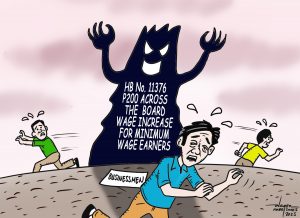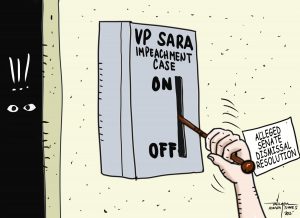Less than two weeks before last Monday’s midterm elections we wrote on this space our third column on our observation that the so-called Partylist system provided by the 1987 Constitution has been bastardized by shrewd politicians. In the same treatises we put the blame on the lack of political will of the Commissioners of the Commission on Elections (COMELEC) to exercise due diligence in vetting the different Partylist organizations seeking accreditation from the poll body.
We were saddened at the thought that the COMELEC seemed blind all these years for not seeing the clear manipulation by certain shrewd politicians and private interests of that particular provision of the 1987 Charter.
Yes, it is the Charter that recognizes the lack of representation of some segments of Philippine society in the government’s lawmaking processes. Hence, the framers of that Constitution wanted to correct that built-in unfairness. This they did by including the provision that those sectors that are seemingly left out in the crafting of policies must be given voice in Congress.
Unfortunately however, the Charter framers may have missed out – or possibly deliberately put in the loophole in that particular provision so that when there is opportunity for them to be in politics they can manipulate it to favor their personal interest.
Clearly it seems, because most of those who crafted the 1987 Charter also prepared their way to running in the first as well as in the succeeding elections after restoring back democracy in the country.
In other words, the supposed to be non-partisan Constitutional Convention members became the most partisan politicians (except for a few) starting in the elections following the dissolution of the revolutionary government established by the late President Corazon C. Aquino.
Yes, we took the trouble of again reading and internalizing the 1987 Constitution. And in doing such we found out that the same provision is not made automatically implementable by the Charter. Instead, it was our understanding that it is Congress that must pass an enabling law to make that particular Constitutional provision operational.
And when we re-read quite seriously the enabling law passed by Congress to have that particular provision implemented we found out that it was shrewdly crafted to give the politicians leeway to sway the law into their own favor.
For example we discovered in the law that the lawmakers somehow deliberately did not identify which sectors of the Philippine population are not having representations in Congress. It did not also specify the number of Partylist groups that can represent the under-represented sectors in the government’s lawmaking body be given slots in Congress. That is why we now have as many as three to five groups vying to represent a single sector in Congress.
The same law also effectively provides for opportunity to members of political families to form their own Partylist groups, have these accredited , so these could become their tool to expand their political base and have their immediate family members occupy the topmost of the Partylist nominees.
Imagine this: there are two Partylist organizations formed, and eventually accredited by the COMELEC despite the all-too-glaring fact that the top nominees are the wife and daughter of a powerful politico. And there is this Partylist group as well that seems to denote the kind of environment that the Filipino people deserve to have. And who is its top nominee? No other but the eldest daughter of a powerful person in government whose popularity in the celluloid catapulted him there.
We have no doubt as well that the bastardization of the politicians of this Charter provision is also abetted by the ruling of the Supreme Court on the petition of some Partylist groups seeking disqualification and cancellation of accreditation of certain Partylist organizations because their nominees were family members of incumbent politicians, or that they were not representing a particular disadvantaged sectors of the population.
According to the High Court ruling denying the petition, the enabling law is clear that it did deny anyone of his/her right to become nominee of a particular under- or non-represented sector in the country’s lawmaking body.
In other words, it is our understanding of the High Court’s ruling that anyone can be a Partylist organization nominee if decided so by its members even if in reality he or she does not really belong to the sector.
Perhaps, because of the number of accredited Partylist organizations there is already need to do away with the mainstream Congressional representation. It seems they already have no more sector left to represent.
So, dear people, want to become lawmakers? Have a Partylist, will get to Congress through the backdoor.



